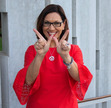Five Questions with Krissy Kneen
I’m (re)starting the series of ‘Five Questions’ with some of my favourite authors, to shine a light on their work, the important stories they tell, their creative talent, and also to support Australian literature across genres, geography and cultures.
My first guest is Krissy Kneen, award-winning author of fiction, poetry and non-fiction including An Uncertain Grace which was shortlisted for the Stella Prize. She has written and directed broadcast television documentaries and is the current Copyright Agency Ltd Non-fiction Fellow. The Three Burials of Lotty Kneen is her latest book.


I’ve read all of Krissy’s works, and The Three Burials of Lotty Kneen is quite possibly equal favourite with The Wintering. I know, I know, it’s apples and oranges, but it’s also about engagement and being carried away by the storytelling. You’ll understand when you read them.
Over to Krissy…
Why did you decide to write this book now?
I could never write this book whilst my grandmother was alive. She would have forbidden it. When she died I felt that I could start to follow the threads of her history. I wanted to write this book whilst my mother was alive. I wanted it to be a gift of love to her. I’m not sure if my mother will actually read the book but I wanted to whisper this shared history to her, and now I feel like I have done this.
You combine memoir, history, poetry and even recipes. How did you decide to include a mix of forms?
It was a difficult and complicated process of research. How can you find out about your family history when you only have a scant trail of breadcrumbs to mark the way? I gathered everything I could along the way. I wasn’t sure what would turn out to be a clue and what would lead to a dead end. This gathering process turned out to be the perfect form for the book. I gathered and kept everything I could and much of this ended up on the page. It is a bit like collage, or perhaps it is more like making a model from paper mache. In that way I am carrying on my grandmother’s art form, recycling everything around me in an attempt to make somethingbeautiful.
How did it feel to set foot in Slovenia, your grandmother’s homeland for the first time?
I really thought it would be a revelation. I thought I’d walk the streets and see hundreds of different versions of myself. It was a disappointment to feel so different from everyone I saw in Ljubljana. There was an initial excitement when I saw the giant statues of dragons on the dragon bridge because that seemed to match my grandmother’s obsession with dragons, but after that I struggled to find glimpses of myself. It wasn’t until I travelled to Egypt and found the mixed-race grandchildren of Slovenian women migrant workers (Aleksandrinke) that I began to see myself. It is odd that cultural heritage can be so specific. I have such a strong connection to the Aleksandrinke and it is such a specific cohort of women but the experience was lifechanging for these women and their descendants have all been marked by it.
Men are remembered in the history books but women are often absent. Do you feel like you are adding to the knowledge of women’s history?
There is so much work that needs to be done to uncover the hidden histories of women. In Slovenia I was struck by how many statues of men – war heroes – there are and yet the one monument to the Aleksandrinke doesn’t even have a plaque near it to tell people what it is. After researching this book I became very passionate about finding some way to make sure these voices where heard. I funded a translation of the only first-person narratives by the Aleksandrinke that exist so now people can hear their voices in English. The process of researching and writing this book has really underlined the fact that women have historically been silenced. My book is just a tiny part of the process that will be ongoing. I don’t feel like we will be able to learn from the past unless we hear the voices of our female ancestors as well as those of the men.
The ghost of your grandmother haunts the book, do you feel like this book has allowed her ghost to rest?
I think I have realised through the writing of this book that my grandmother and I are and will always be intimately entwined. Every story I tell is in some way influenced by her. She is the first and strongest voice in my life and I have folded her into myself. The ghost of my grandmother will always be inside me. Sometimes she will be calm and at other times she will be restless but she will always be the driving force behind my creativity. I believe that all the stories we tell are just ways of trying to make sense of ourselves and our communities. This book has helped me accept that my grandmother has brought me into a strong and important community. I am truly grateful that I am finally a part of a community. I hope my work from here on will honour that legacy.
You can follow Krissy on Twitter, Facebook and Instagram.
And one of the best things you can do to support your favourite authors, is to review their work on Goodreads.



